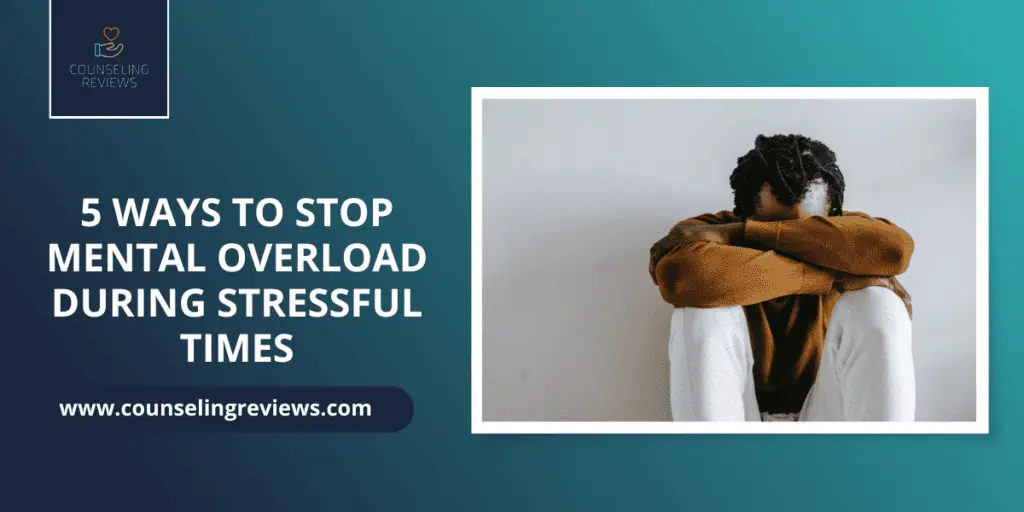You may have come across the terms “mental overload” or “brain overload” previously. People use these terms interchangeably and refer to a mental phenomenon in which they cannot think or do anything efficiently.
Feeling overwhelmed psychologically is usually due to exposure to many things. Your brain cannot handle processing a lot of information or input simultaneously. Stress can further worsen your brain’s capacity to process information, resulting in a more severe form of mental overload.
In this article, let’s look at what mental overload is and how you can deal with that during stressful times.
What does mental overload mean?
The human brain is a complex organ that receives information from sensory organs such as eyes, ears, nose, tongue, and skin. The information received from sensory organs is known as sensory input. The brain perceives these sensations based on information previously stored in memory.
However, when there is a lot of sensory input, it can result in sensory overload. This means that you are watching or listening to more than your brain can handle. In addition to sensory overload, you can also experience cognitive overload. Cognition refers to internal mental processes such as thinking, information processing, and retrieval from memory.
When you overthink or try to process a lot of information, you can experience cognitive overload. People who are not familiar with psychological jargon often call these phenomena “brain overload” or “mental overload”. You might have even heard of the expression “analysis paralysis” — when your mind has to deal with more than it can handle, it stops working efficiently.
Both sensory and cognitive overload can result from experiencing stress and exhaustion.
Why mental overload occurs when there is greater stress
Stress can be defined as a situation in which you feel challenged and have to deal with that situation no matter what. This could be due to an upcoming presentation at work or difficult life situations such as going through a divorce. We can feel stressed out for several reasons, including having to deal with health-related concerns.
During times like these, our brains cannot handle the usual amount of sensory input. It also cannot process information efficiently or retrieve information from memory. Negative thoughts may become commonplace, and you may try to escape the situation because it feels overwhelming.
Stress aggravates both sensory and cognitive overload, which can lead to interpersonal conflicts, reduced productivity, and poorer mental health outcomes.
However, there are several things you can do to avoid mental overload or at least reduce its intensity. Here are five tips to reduce cognitive and sensory overload.
1. Keep your surroundings tidy.
It is scientifically proven that a cluttered environment leads to sensory overload. If you have too many things around you, you cannot focus on what is most important. In addition, you may feel agitated and feel guilty that you are not keeping your surroundings clean. Start cleaning your living or working environment and ensure it is clutter-free. Personal hygiene is essential too. Hence, after tidying up your surroundings, take a warm bath if you work from home. You will feel energized and less overwhelmed by what you see.
2. Avoid overexposure to media and communication.
As most of us work on electronic gadgets, it is quite impossible to shun media and communication entirely. You will probably have to check office emails, answer telephone calls, or even use the internet for work-related tasks. However, you can certainly minimize your screen usage and ensure you do not use any screen for a few hours before bed. This gives your brain ample time to relax so that you can fall asleep quickly. This helps you to be more productive and efficient the next day.
3. Get close to nature
Most people are stuck in hyper-urbanized environments. They hardly find an opportunity to connect with nature. Connecting with nature can help reduce stress and improve your brain’s capacity to perceive and process information. Take long walks in the park or spend time with a pet. If you have space available, you can also try gardening. No matter how you decide to connect with nature, it will have a positive and healing effect on your mind.
4. Practice meditation or exercise.
Mindful meditation can help you to be less judgemental about how your brain reacts to stress. The more you criticize yourself for responding in a particular manner, the more you will feel overwhelmed, resulting in cognitive overload. To break this cycle, meditate for at least 10 minutes, and begin to observe your thoughts and feelings non-judgmentally. This helps your mind to calm down.
You can use a meditation device to assist you, or try different techniques of meditation until you find something that you like. If meditation is not your thing, you can also try working out at a gym.
5. Take frequent breaks
When your brain is exposed to a lot of information and you are overthinking, it is crucial to put a halt. Taking frequent breaks is an excellent strategy for dealing with mental overload associated with stressful situations. Look away from your computer screen for five minutes every 25 minutes. You can also walk for 10 minutes on a treadmill every other hour. Other options include palming (covering your eyes with your palms to block light) for ten minutes, calling your friends, etc.
Address stress to avoid mental overload
Today, most people are stressed out and frequently complain about being stressed out. Consequently, they also experience both sensory and cognitive overload. The best way to deal with mental overload is to create a clutter-free environment and reduce screen exposure.
The next step is reconnecting with nature and engaging in physical activity or meditation. Last but not least, taking frequent breaks is essential so your brain gets the rest it needs in between bursts of activity.
If you feel that your mind is overloaded even after trying the above tips, you might need professional therapy to deal with stress. Both online and offline talk therapy can help you learn strategies to deal with different stressors and reduce mental overload.





